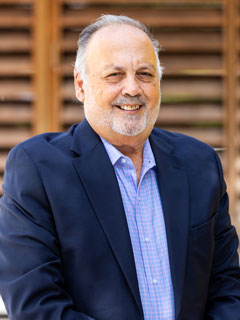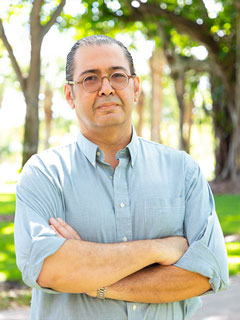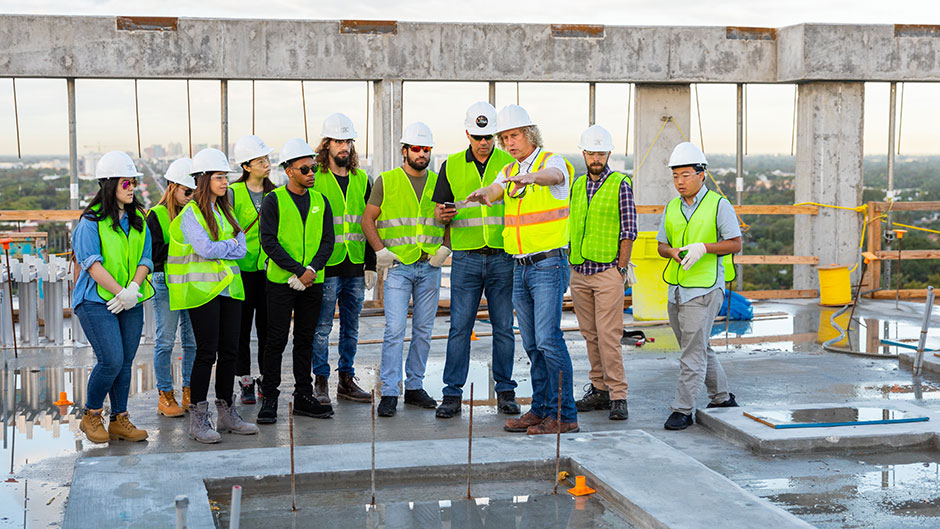In the past 50 years, the manufacturing, agriculture, and transportation industries have all embraced new technology and steadily increased in productivity.
Yet in the construction industry, productivity remains stagnant and is even declining a bit, said University of Miami School of Architecture assistant professor Armando Montero.

“The construction industry is one of the largest and the least efficient industries in the world, so we’re at a tipping point,” Montero said. “Construction has always been a rear-view mirror process, but we have to change and address that inefficiency.”
In response, the University’s School of Architecture and College of Engineering are both offering new master’s programs in construction management that cater to working professionals. The programs offer students a crash course in construction and often require them to spend time at building sites to get hands-on experience.
Esber Andiroglu, a civil and environmental engineering associate professor who directs the master of science program at the College of Engineering, said industry leaders urged UM to create these programs because they are in need of managers who are knowledgeable about the latest techniques. In addition, he said climate change is causing new dilemmas that previous construction practices do not address.
“There’s so much innovation and technology in the construction industry, like 3-D visualization, creative financing operations, and new materials and regulations, which are urgently needed in response to new challenges,” Andiroglu said. “A lot of people in the construction industry are great managers and are skilled in various trades, but they are not as comfortable with technological innovations and how to apply them to projects.”
Montero, who is also director of the School of Architecture’s master’s program, agrees. To ensure students are getting as much practical knowledge as they can, many faculty members are working professionals in the construction, architecture, engineering, real estate, and legal fields. Both programs offer classes that cover construction design and methods, as well as business and legal aspects of the industry. Students are not required to be engineers or architecture majors, but Montero and Andiroglu said a background in those areas gives students an advantage.
Ramon Hernandez is a master’s candidate who works in information technology at Coastal Construction. Previously, he worked for a smaller construction company building new homes and renovating rental properties. Although Hernandez did not study construction in college, after his first job, he realized that he enjoyed the field. With his degree, Hernandez hopes to transition into a more hands-on position.
“Through the MCM program, I saw an opportunity to solidify my education more formally and build upon what I had learned building new single family homes,” he said.
On a recent morning just after dawn, Hernandez joined his classmates at the bottom of the Gables Station construction site. He spent the next hour traversing the future multi-story residential and commercial building towers that surround the Metrorail along U.S.1 in Coral Gables with School of Architecture lecturer Christian Steputat, who is also a consulting chief engineer and special building inspector on the project. Steputat pointed out structural reinforcing, and the use of table-forms, which are used to form the floors of a high-rise building.
Steputat’s class is part of the School of Architecture’s master’s program, and he does site tours periodically as part of his course on advanced construction materials, building codes, and methods.
“The idea is to give our students a sense of belonging, to be an integral part of projects and be knowledgeable and well-versed in a plethora of construction related subjects, so students can seamlessly integrate into the construction industry,” said Steputat, a licensed engineer and structural inspector who has worked on large-scale building projects in five continents.
Steputat recently covered post-tensioning tendons, or steel rods used to fortify the floors of a high-rise building, along with inspection procedures, and concrete in class. The next morning, students were able to see post tensioning tendons that were partially complete, along with a concrete pour in action at the Gables Station site.
Hernandez said he enjoyed the chance to see these concepts in action.
“It was the first time I had been to a project that size and Christian provided valuable insight into the design and processes to understand how everything fits together,” Hernandez said. “These projects are so complicated in their own ways, so it was cool to see how every job is different.”
Similarly, a forensic engineering course in the College of Engineering is team taught by five engineers from different areas, as well as an attorney. The class examines real lawsuits that stemmed from construction mistakes – such as mold remediation situations, and the faculty explain how to navigate these tense situations to correct mistakes and finish projects in a timely way, Andiroglu said. As part of a different course, students are able to earn certification in green building and energy management, he added.

All of the faculty involved see the need for students to get out into the field to learn about different facets of construction, and new updates to things like building codes. Andiroglu said some of his students have participated in Miami-Dade County task forces for energy and water usage, and learn about new local, state, and national construction codes as part of the curriculum.
“We need the next generation moving forward in construction to be properly trained,” added Andiroglu, who teaches sustainable construction. “A lot has changed since the Internet came along, and the industry needs to embrace innovation, technology, and science together with management skills. By offering cutting-edge courses that respond to the needs of local organizations and governmental agencies, our graduates can become effective contributors towards resilience efforts in our region and beyond. ”
To learn more about the Master’s in Construction Management through the School of Architecture, visit: https://www.mcm.arc.miami.edu/index.html
To learn more about the Master’s of Science in Construction Management through the College of Engineering, visit: https://www.umcoe.miami.edu/construction-management/

